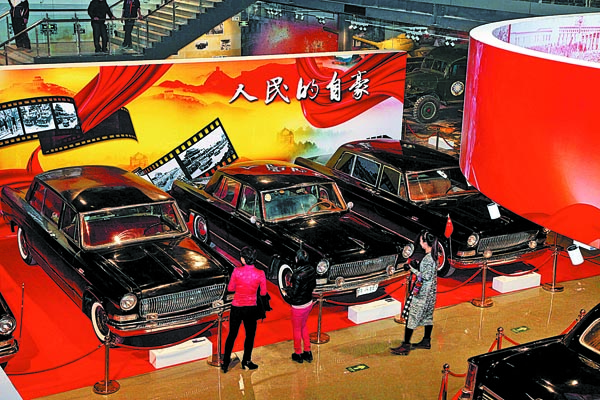

The Beijing Classic Car Museum, located in the capital's Huairou district, houses more than 100 Chinese and foreign vintage limousines, all treasured by museum owner Luo Wenyou.
"I've been fascinated with machines and automobiles since I was young," says the 67-year-old Luo, adding that he considers himself fortunate to pursue his interest as a lifelong endeavor. "When I was a kid, I used to chase behind tractors to see how they plowed the field."
Luo's collection began with a Polish Warszawa sedan that he acquired in 1977. However, in the following decades, Luo was more focused on China's first generation of automobiles.
In the mid-1980s, Luo bought his first Hongqi car. Established in 1958, Hongqi, meaning "red flag", is China's iconic homegrown car brand and it has been used as the chief vehicle for parades at national celebrations.
Chinese people have regarded the brand as the nation's pride due to its historical significance. There are more than 70 Hongqi vehicles in Luo's museum, some of which were once used by Chinese leaders, according to Luo.
In 1998, the classic car collector took part in the Louis Vuitton Classic China Run, driving a three-row seat Hongqi from Northeast China's Dalian to Beijing as the sole Chinese participant in the rally.
"During the rally, Chinese fans cheered for me, while many foreign drivers wanted to give the Hongqi a try. I was really touched and made up my mind to collect more Chinese vintage cars of this brand since it represents a national achievement," he says.
Luo says he spent over a decade planning and eventually established the classic car museum in 2008, adding that most of the vintage limos there are more than 30 years old with all original parts and still operable.
Luo has organized many vintage car rallies in collaboration with fellow enthusiasts across the country in recent years. In 2019, he set up another museum in Shiyan city, central Hubei province. All these efforts stem from his passion for classic cars, especially Chinese-made automobiles.
"The auto industry demonstrates a country's strength in manufacturing and science and technology, and thus, the collections in my museum portray the development of China's auto industry from scratch and show Chinese workers' spirit of hard work and perseverance," Luo says.
Today, China's auto sector has accelerated its growth and achieved international prominence, and Luo is proud of it.
"I will continue to share the stories behind the classic automobiles in the museum with as many people as possible, so that our international friends may have a better understanding of China's auto industry and the country's progress through the decades," Luo says.